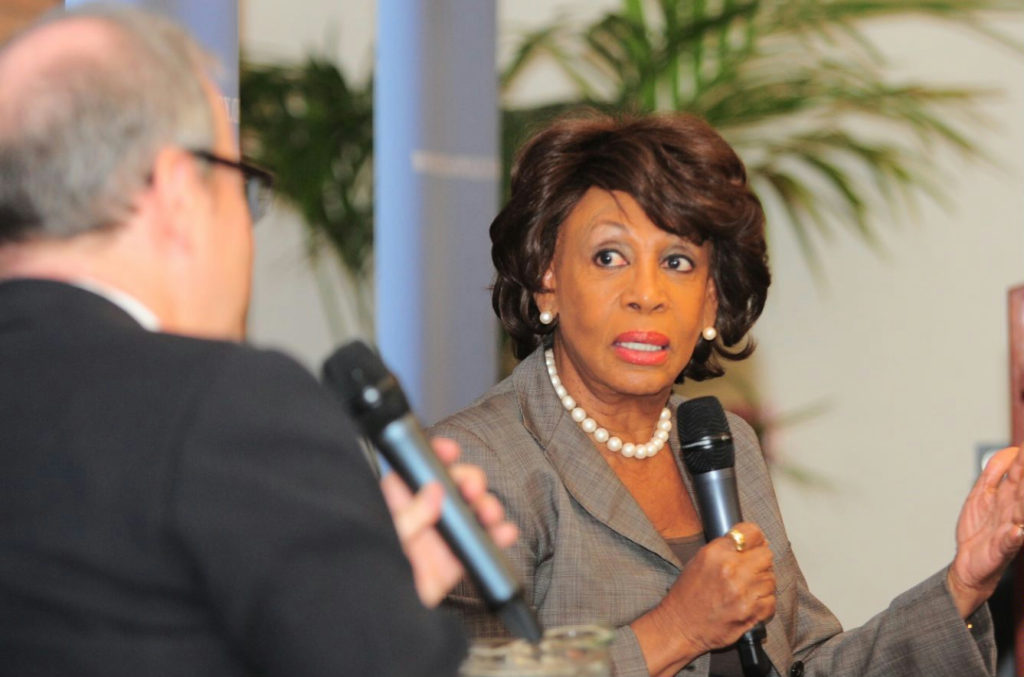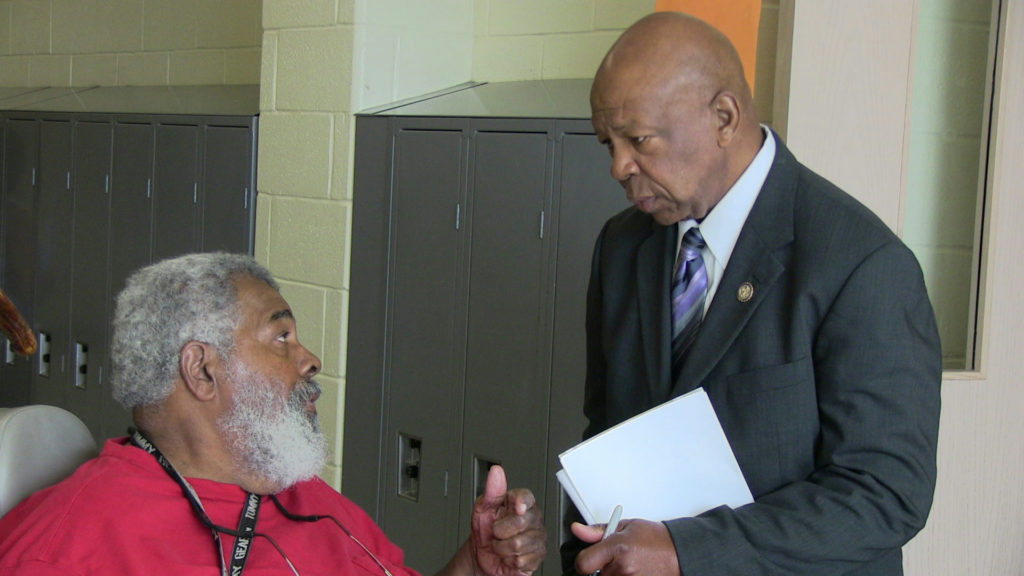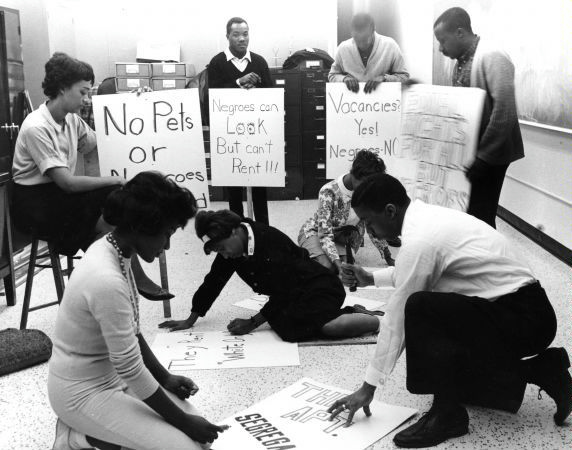Fair Housing: Spotlight – Predatory Lending
Learn about the leadership of African-American legislators in the struggle to pass the Fair Housing Act of 1968 and the continuing effort to eradicate discriminatory housing policies and practices.

Rep. Maxine Waters at Bipartisan Policy Center Housing Commission Forum (2013)
Rep. Maxine Waters (CA) speaking at Bipartisan Policy Center Housing Commission Forum. The forum explored pressing issues in housing in 2013 including demographic trends impacting housing markets, efforts to link housing and healthcare to serve the most vulnerable populations, access to credit for prospective homebuyers, and efforts to incentivize the adoption of energy efficiency measures in housing.
In 2007, the United States housing market crashed and set into motion a chain of events exposing major instabilities in the nation’s financial system. Several of the country’s largest financial institutions collapsed and the nation plunged into economic recession. According to the Center for Responsible Lending, between 2007 and 2012 over 12.5 million homes went into foreclosure, many secured through the purchase of subprime mortgages.
Deregulation of the mortgage lending industry in the 1980s and growth of securitization in the 1990s opened the door for the increase of subprime mortgage lending and predatory lending practices. Though subprime lending is not synonymous with predatory lending, most lenders offering subprime mortgages during the time were not subject to the same mortgage laws and regulations as other mortgage lenders. As the subprime market grew, lenders regularly included predatory features in subprime mortgages that increased the risk of foreclosure. Features like adjustable interest rates, balloon payments, prepayment penalties, and loans with limited documentation of borrowers’ ability to make payments left many homeowners facing default.
At its core, the subprime lending crisis was also a fair housing crisis. For most of the 20th century, lending discrimination occurred primarily through redlining, or denying mortgage credit to minorities or to the neighborhoods in which they lived. This historic legacy left many residents of minority and low-income communities with limited access to credit. In the last few decades, subprime lenders and brokers began reverse redlining or targeting these credit-starved communities for predatory loans often issuing mortgages borrowers could not afford. In many cases, borrowers with good credit histories were steered into subprime mortgages even if they qualified for a prime mortgage. While this increased access to credit allowed for the highest homeownership rates in U.S. history, predatory loan terms soon led to the widespread foreclosure of properties purchased by minority borrowers. For African Americans and Latinos who traditionally hold most of their wealth in their homes, this was devastating.
Members of the Congressional Black Caucus represented many of the districts hardest hit by the crisis. They were also among the earliest members of Congress to call attention to the disproportionate impact of predatory lending on minority communities. Starting early in the 2000s, CBC members introduced legislation to increase disclosures in mortgage lending, restricting fees, and prohibiting mortgage discrimination.
Between 2002 and 2008, the CBC investigated many of the issues that would eventually contribute to the housing crisis through a series of hearings, district-level forums and national town hall meetings. Most notable were those conducted by the CBC Housing Task Force in 2002 and a series of district-level forums in 2005 focusing on the impacts of predatory lending on American borrowers. In 2008, CBC members also participated in a national town hall discussion at the Congressional Black Caucus Foundation’s Annual Legislative Conference (ALC) to address the mortgage crisis and recovery solutions. Click here to watch the ALC session
CBC members led the way in legislative efforts to curb predatory lending practices. In 2002, for example, Rep. Stephanie Tubbs Jones (D-OH), then chair of the CBC Housing Task Force, led fourteen CBC members in introducing the Predatory Mortgage Lending Practices Reduction Act. The Act was designed to protect home buyers by requiring federal certification of mortgage brokers and agents involved in the subprime mortgage market. It outlined stiffer penalties for violation of federal fair lending and fair housing laws and included provisions authorizing funding for community-level programs to educate borrowers about discriminatory and predatory lending practices. Three years later, in 2005, then CBC chair Rep. Melvin Watt (D-NC) worked with other members of the House, Reps. Brad Miller (D-NC) and Barney Frank (D-MA), to create a bill modeled on a law from his home state of North Carolina that had successfully ended many predatory lending abuses within the state. The vast majority of CBC members signed on as cosponsors of the Mortgage Reform and Anti-Predatory Lending Act of 2007.
Reps. Maxine Waters (D-CA) and Marcia Fudge (D-OH) also championed the issue of fair lending by introducing legislation to promote responsible lending practices. In 2001, Rep. Waters, a leader on financial issues in Congress and outspoken critic of predatory lending practices, introduced the Protecting Our Communities from Predatory Lending Act. The bill was aimed at protecting borrowers from losing homes to predatory lending by, among other things, prohibiting mortgage lenders from making false, deceptive, or misleading statements or steering consumers into higher risk loans than they would otherwise qualify for. In her 2009 Predatory Mortgage Lending Practices Reduction Act, CBC chair Rep. Fudge outlined a rigorous certification program for mortgage brokers and agents who issue subprime loans as well as a streamlined process for filing complaints against unethical brokers and agents.
CBC members also played an important role in major reforms of the mortgage market. Many CBC members, including Reps. Melvin Watt (D-NC), Maxine Waters (D-CA), Andre Carson (D-IN), Elijah Cummings (D-MD), and Gregory Meeks (D-NY), worked to include provisions in the Dodd-Frank Wall Street Reform and Consumer Financial Protection Act of 2010 that helped address risky lending, create the historic Consumer Financial Protection Bureau, address disproportionate predatory lending to minority neighborhoods, and provide mortgage relief to those facing foreclosure.
After the onslaught of the crisis, CBC members worked to develop solutions for individuals and communities suffering from foreclosure. In 2008, Rep. Waters worked with stakeholders and colleagues in both the CBC and on the Financial Services Committee to create the Neighborhood Stabilization Program, a program to empower local governments to purchase and redevelop foreclosed or abandoned properties into affordable housing for working families. Caucus members also came together under the leadership of Michigan Reps. John Conyers and Carolyn Kilpatrick in 2010 to call for a moratorium on foreclosures in all states until issues of fraudulent paperwork could be investigated and resolved. CBC members also addressed the crisis’ impact on their constituents by holding district-level forums and workshops on foreclosure. These forums provided space for constituents to present grievances, obtain housing and mortgage counseling, and work with lending institutions to develop solutions to prevent foreclosure on their properties.
Though the housing market showed some evidence of recovery by 2013, many communities continued to feel the shock wave of predatory lending and the foreclosure crisis. CBC efforts to aid America’s struggling homeowners through legislation and ensure fairness in the recovering mortgage market continued. That year, President Barack Obama also nominated CBC member Rep. Watt to lead the Federal Housing Finance Agency (FHFA). The FHFA is the federal agency which regulates the secondary mortgage market by overseeing the activities of Fannie Mae, Freddie Mac and the Federal Home Loan Banks. The CBC and numerous other civil rights organizations supported the nomination. They cited Rep. Watt’s 40-year commitment to safe and sound lending practices as experience preparing him to ensure lender accountability and safeguard mortgage consumer in the regulatory role. The Senate confirmed Rep. Watt’s appointment in late 2013 and he was sworn into office in January of 2014.
The advent of the Trump administration in 2017 brought an increase in efforts to weaken mortgage lending protections. In 2017 and 2018, the CBC raised alarms about attempts to reverse Consumer Financial Protection Bureau (CFPB) mortgage lending rules, particularly the qualified mortgage rule which restricts the types of loans lenders can offer and ensures that the borrower has the ability to repay the loan. The CBC warned that loosening these standards would again expose borrowers, especially in communities of color, to predatory lending and increase the risk of foreclosure.
More recently, the CBC has partnered with the CFPB to address “digital redlining,” where algorithmic biases in AI and automated lending systems lead to racial discrimination in mortgage lending. Today, the CBC continues working tirelessly to end predatory lending, address foreclosure issues head on, and develop solutions to ensure the nation’s residents access to credit on fair terms.
Select examples of anti-predatory lending legislation proposed by CBC members:
Protecting Our Communities From Predatory Lending Practices Act (H.R. 3607)
December 20, 2001
107th Congress
Introduced by Rep. Maxine Waters (CA)
A bill to prohibit mortgage lenders from making false, deceptive or misleading statements or engaging in unfair or deceptive lending practices as well as to prohibit steering consumers into higher risk grades than they would otherwise qualify for.
Predatory Mortgage Lending Practices Reduction Act (H.R. 3807)
February 27, 2002*
107th Congress
Introduced by Rep. Stephanie Tubbs Jones (OH)
Cosponsored by 16 members of Congress including CBC members Rep. Barbara Lee (CA), Rep. Donald Payne (NJ), Rep. Corrine Brown (FL), Rep. Wm. Lacy Clay (MO), Rep. James Clyburn (SC), Rep. Elijah Cummings (MD), Rep. Danny Davis (IL), Rep. Chaka Fattah (PA), Rep. Sheila Jackson Lee (TX), Rep. Carolyn Kilpatrick (MI), Rep. Bennie Thompson (MS), Rep. Edolphus “Ed” Towns (NY), and Rep. Albert Wynn (MD)
A bill to prohibit any person, in connection with a subprime federally related mortgage loan, from providing mortgage lending services or mortgage brokerage services unless such person is certified by HUD as having been adequately trained with regard to subprime lending.
*Rep. Tubbs Jones reintroduced this bill in in 108th-110th Congresses under the following bill numbers: H.R. 1663 (April 8, 2003), H.R. 1994 (April 28, 2005), and H.R. 2061 (April 26, 2007)
Prevention of Predatory Lending Through Education Act (H.R. 1865)
April 29, 2003+
108th Congress
Introduced by Rep. David Scott (GA)
Cosponsored by 15 members of Congress including CBC members Rep. Artur Davis (AL), Rep. William. Lacy Clay (MO), Del. Donna Christensen (VI), Rep. Elijah Cummings (MC), Rep. Sheila Jackson Lee (TX), Del. Eleanor Holms Norton (DC), and Rep. Major Owens (NY)
A bill to authorize the Secretary of Housing and Urban Development to make grants to States, units of local government, and nonprofit organizations for counseling and education programs for the prevention of predatory lending and to establish a toll-free telephone number for complaints regarding predatory lending.
+ Rep. David Scott reintroduced this bill in the 109th Congress as H.R. 2000 (January 4, 2005)
The Prohibit Predatory Lending Act (H.R. 1182)
March 9, 2005
109th Congress
Introduced by Rep. Melvin Watt (NC) with Rep. Brad Miller (NC) and Rep. Barney Frank (MA)
Cosponsored by 65 members of Congress including CBC members Rep. Sanford Bishop (GA), Rep. Corrine Brown (FL), Rep. G.K. Butterfield (NC), Rep. Julia Carson (IN), Del. Donna Christensen (VI), Rep. Wm. Lacy Clay (MO), Rep. James Clyburn (SC), Rep. John Conyers (MI), Rep. Elijah Cummings (MD), Rep. Artur Davis (AL), Rep. Chaka Fattah (PA), Rep. Harold Ford Jr. (TN), Rep. Al Green (TX), Rep. Jesse Jackson Jr. (IL), Rep. Sheila Jackson-Lee (TX), Rep. William Jefferson (LA), Rep. Eddie Bernice Johnson (TX), Rep. Stephanie Tubbs Jones (OH), Rep. Carolyn Kilpatrick (MI), Rep. Barbara Lee (CA), Rep. John Lewis (GA), Rep. Cynthia McKinney (GA), Rep. Kendrick Meek (FL), Rep. Gregory Meeks (NY), Rep. Gwen Moore (WI), Del. Eleanor Holmes Norton (CD), Rep. Major Owens (NY), Rep. Donald Payne (NJ), Rep. Charles Rangel (NY), Rep. Bobby Rush (IL), Rep. David Scott (GA), Rep. Bobby Scott (VA), Rep. Bennie Thompson (MS), Rep. Edolphus Towns (NY), Rep. Maxine Waters (CA), Rep. Diane Watson (CA),and Rep. Al Wynn (MD)
A bill to impose restrictions and limitations on high-cost mortgages, to revise the permissible fees and charges on certain types of loans, to prohibit unfair or deceptive lending practices, and to provide for public education and counseling about predatory lenders. Also known as the Miller-Watt-Frank bill.
Supporting home ownership and responsible lending (H.Con.Res. 127)
April 24, 2007
110th Congress
Introduced by Rep. Elijah Cummings (MD)
Cosponsored by Rep. Keith Ellison (MN)
A concurrent resolution expressing the view of Congress that legislation should be enacted that protects buyers who have been victims of unscrupulous mortgage brokers and lenders.
Supporting the goal of increased and sustainable homeownership in the United States (H.Con.Res. 392)
July 17, 2008
110th Congress
Introduced by Rep. Alcee Hastings (FL)
Cosponsored by 8 other members of Congress including CBC members Rep. Sanford Bishop (CA), Rep. Artur Davis (AL), Rep. Al Green (TX), Rep. Carolyn Kilpatrick (MI), Rep. Kendrick Meek (FL), Rep. Stephanie Tubbs Jones (OH), and Rep. Barbara Lee (CA)
A concurrent resolution supporting the goal of increased and sustainable homeownership in the United States and recognizing the importance of homeownership programs, fair lending laws, and fair housing laws in achieving that goal.
Recognizing the disparities that are associated with predatory lending in minority communities (H.Con.Res. 391)
July 17, 2008
110th Congress
Introduced by Rep. Yvette Clarke (NY)
Cosponsored by Rep. Edolphus Towns (NY)
A concurrent resolution recognizing the disparities that are associated with predatory lending abuses in minority communities and expressing the view of Congress that as new abuses continue to emerge, such laws should ensure that all those responsible for representing and protecting families have the authority to act to address these new problems.
Predatory Mortgage Lending Practices Reduction Act (H.R. 1782)
April 27, 2009
111th Congress
Introduced by Rep. Marcia Fudge (OH)
A bill to prohibit any person, in connection with a subprime federally related mortgage loan, from providing mortgage lending service or mortgage brokerage services unless such person is certified by the Secretary of Housing and Urban Development and has been adequately trained with regard to subprime lending.
Mortgage Reform and Anti-Predatory Lending Act (H.R. 1728)
March 26, 2009
111th Congress
Introduced by Rep. Melvin Watt (NC) with Rep. Brad Miller (NC) and Rep. Barney Frank (MA)
Cosponsored by four other members of Congress
A bill to reform consumer mortgage practices that provides accountability and creates certain minimum standards for consumer mortgage loans.




